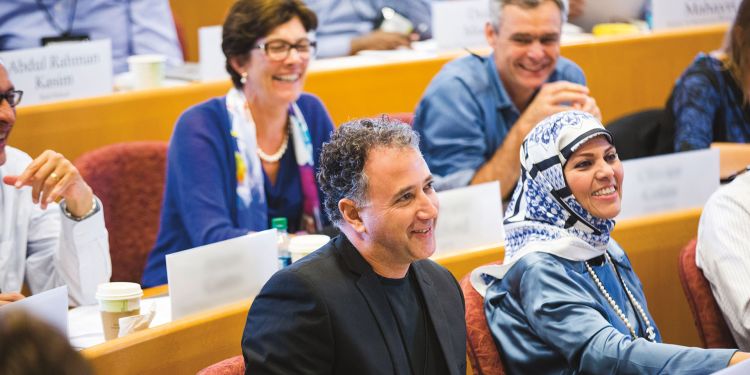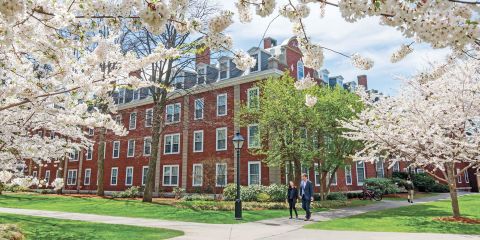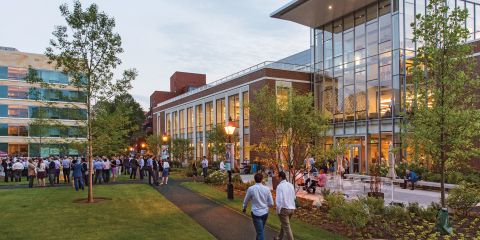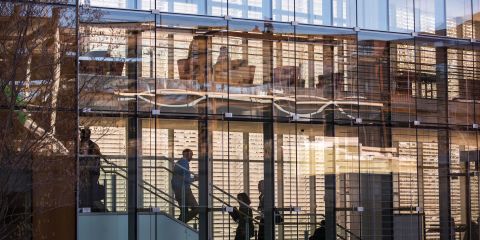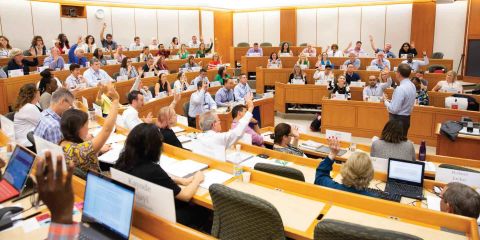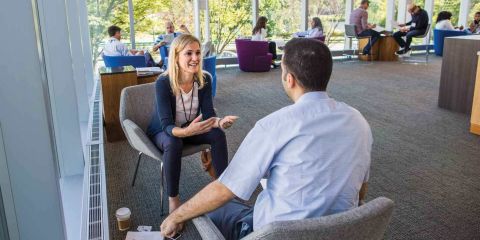While HBS delivers the majority of its Executive Education programs in Boston, we conduct research and deliver global leadership programs to serve the needs of executives from all over the world. In her role as regional director of client development, Rukmani Bagai partners with organizations that send participants to a wide range of HBS Executive Education programs, both on campus and regionally. Below, she explains how the changing face of the pandemic has affected executive education in her region.
WHAT WAS THE PANDEMIC'S INITIAL IMPACT ON HBS EXECUTIVE EDUCATION'S ACTIVITIES IN INDIA?
HBS Executive Education had to pivot overnight—and shift into virtual offerings. This change affected different audiences in different ways. The executives we work with in India fall into three main categories. First are executives who have never been to any of our programs and did not know what an in-person program was like. For them, virtual programs were a good option. A second group had been to our Boston campus and wanted to come back, but had immediate business challenges for which they needed specific skills. They were also very receptive to our virtual programs. A third group had been to our programs in India and Boston; they wanted very much to come to an on-campus program but had to wait a bit.
WHO WAS MOST ATTRACTED TO VIRTUAL PROGRAMS?
Pre-pandemic, some executives, especially women with young children, had been hesitant to come all the way to Boston from India or Asia for a short 3-5-day program. That is a lot of time away from family for them, so the virtual programs introduced during the pandemic were a welcome option. If they had been considering one of our longer comprehensive leadership programs, they discovered that with the revised blended formats, they did not have to be away for quite as long.
We also worked with client companies to create several custom programs that were delivered virtually. For example, we collaborated with the India subsidiary of one of the largest multinational technology companies in the world to create a virtual program to address some of their specific business challenges. Rather than flying executives to an in-person program, they saved on the cost of business-class or first-class flights. They also reduced the risk associated with having all of their executives in one place during the pandemic. The virtual option made the program more attractive to them. Similarly, we were able to customize a program for another large multinational IT company with headquarters in India.
HOW ARE CONDITIONS CHANGING NOW? ARE MORE PEOPLE LOOKING TO ATTEND ON-CAMPUS PROGRAMS?
Companies had been uncertain about their plans, but they are more optimistic now. They want their leaders to go through these transformations and come back ready to cascade that impact throughout the organization.
The practicalities are also becoming easier. When the pandemic started, we had many discussions about vaccinations and restrictions. Executives who wanted to get U.S. visas experienced delays because U.S. consulates had a huge backlog. That is improving now. Today, the discussion is more about "when can we come?"
Executives in the region are looking forward to coming to the HBS campus. They see the Boston campus as the temple of education. Many have heard about the on-campus experience from friends or colleagues and want to experience that for themselves—including the opportunity to learn and network with senior executives from all over the globe. Learning from peers who represent so many countries is one of the best forms of education.
ONE OF YOUR FOCUSES HAS BEEN THE SENIOR EXECUTIVE LEADERSHIP PROGRAM–INDIA (SELPI). HOW HAS THAT PROGRAM EVOLVED?
This year, we are celebrating the eleventh program in our senior executive leadership program portfolio. These programs help executives develop the skills needed to lead in emerging markets. The first senior executive leadership program was in India, and then we added a program for the Middle East and then China. The India program comprises three modules that take place in India and Boston. We had to tweak the format over time, especially during the pandemic, but we always end the program in Boston.
One recent success story of which we are particularly proud is Kasturi Wilson, who attended SELPI three years ago and was recently promoted to serve as the first female CEO of a conglomerate in Sri Lanka. We try to recruit more women for all our programs and add more diversity in general. Everyone benefits from having a wider range of perspectives in the classroom—because if we all are thinking the same way, we are not thinking.
WHAT WOULD YOU SAY IS ESPECIALLY UNIQUE ABOUT PROVIDING EXECUTIVE EDUCATION IN AN INDIAN CONTEXT?
Demographically, India has a very young population, with about 65% of the population under the age of 35. Like other places in the world, the pandemic caused a big churn in the job market, with people changing jobs and taking on new roles. That generates a significant need for leadership development.
In addition, Indian culture is very family-oriented. At the end of SELPI, for example, we have a graduation ceremony where executives bring their families to celebrate and take pictures. For these executives and their families, receiving HBS alumni status is a big milestone. Families are part of the decision to attend the program and part of celebrating the accomplishment.
WHAT ARE SOME OF THE MORE DURABLE CHANGES YOU HAVE SEEN AS A RESULT OF THE PANDEMIC?
During the pandemic, business leaders and executives had a lot of time at home to think about their businesses, their careers, and their lives. While turbulence in markets is perennial, the pandemic has brought a new understanding of just how rapidly conditions can change. That has forced people to consider business resilience and personal resilience in the face of adversity. The importance of having a deep purpose—as a business and as an individual—is now clearer. In addition, people are now much more willing to invest in themselves. Circumstances can take everything else away from you, but one thing you always have is your education.


